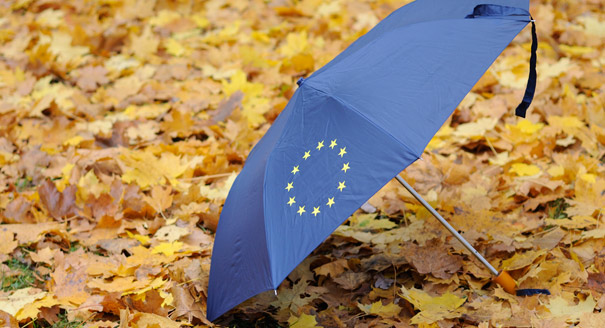Two big issues will dominate the European Union’s agenda when the summer vacation winds down and civil servants return to deal with the crucial dossiers that will shape the future of Europe and the transatlantic relationship.
The first is Brexit. The second is terrorism. The two are connected. And both will have consequences for how Europe deals with the United States, whichever candidate enters the White House in January 2017.
The negotiations to take Britain out of the EU, following the UK’s June 23 vote to leave the bloc, will begin in earnest in September. The EU’s executive, the European Commission, is already forging ahead by putting in place a strong team—unlike Britain.
British Prime Minister Theresa May’s government not only lacks enough civil servants to take on this unprecedented task, which covers so many issues. It is also missing officials to deal with the crucial topic of trade, especially after Leave campaigners swore during the referendum campaign that Britain’s economy and trade relationship with the rest of the world would be in a far better position with the country outside rather than inside the EU.
Leaving the EU will mean Britain will have to apply to the World Trade Organization. The country is currently in the WTO by virtue of being in the EU. Neither Leave nor Remain campaigners thought about that before the referendum—or if they did, they didn’t dare raise it.
What the Remain campaign kept emphasizing was how Britain needed the EU, and vice versa, to fight terrorism. The spate of terrorist attacks in Brussels, France, and now Germany has shown that Europe is not immune to terrorism—as if it needed reminding.
The attacks also show another side to the EU. The comfort zone that most European leaders—and their citizens—took for granted is over. Terrorism is now the number one issue preoccupying EU leaders, who finally have a common threat perception.
That is why the decision by European Commission President Jean-Claude Juncker to appoint Sir Julian King, Britain’s former ambassador to France, as the commission’s security commissioner is a masterstroke. Yes, it is easy to mock Juncker’s public mannerisms. But he sure knew what he was doing by making a Brit run what is now one of the most important portfolios (along with trade and competition policy).
For one thing, apart from surprising London, the move gives Britain a special place in the EU to organize in a much more coherent fashion a counterterrorism unit and philosophy. Until now, terrorism issues were part of European Commissioner Dimitris Avramopoulos’s portfolio, which includes migration. Needless to say, Avramopoulos has been totally preoccupied with that issue. Now, there is one person to deal with terrorism and security, and an Atlanticist at that.
This is good for Britain and good for Europe. King, who was also ambassador to the EU’s Political and Security Committee, can lean on his wide experience of Britain’s intelligence services—and of France’s. So David Cameron, who resigned as prime minister once the Leave campaigners had won, has achieved what he wanted: Britain and the rest of Europe working together to counter terrorism.
This has a bearing on the transatlantic relationship. From a European perspective, those ties couldn’t be in worse shape, and not only because of the appalling political discourse of the U.S. presidential election campaign, with Republican candidate Donald Trump effectively discarding NATO.
NATO is only part of the glue that has kept the West solid and consistent since the end of World War II. European leaders and their publics can no longer take for granted this alliance and security umbrella that the United States has unflinchingly provided for sixty-seven years. U.S. and European leaders need to link the fragility of the alliance to the fragility of the West.
The West has long espoused the values of free trade, liberalism, the rule of law, and tolerance. These values have made the West special and a beacon for those seeking an alternative model to autocratic and corrupt regimes. But free trade is now under threat as protectionism and antiglobalization gain ground on both sides of the Atlantic. This bodes ill for any successful outcome of the talks on the Transatlantic Trade and Investment Partnership (TTIP).
These talks are about much more than trade, the alignment of standards, and consumer issues. They are also about putting the transatlantic relationship onto a new level on which the West would be strong and united enough to set the international rules for many issues that will have a profound impact deep into the twenty-first century. Security is one of the biggest of those challenges.
That is why, in some small but significant way, King’s appointment just might focus the EU in a much more systematic way on dealing with terrorism and balancing counterterrorism measures with Europe’s values. And with this new security commissioner in place, maybe—and it’s a big maybe—the EU and NATO might put real substance on the agreement they forged at NATO’s summit in Warsaw on July 8–9, when the two organizations decided to put aside their differences and cooperate.
It’s a lot to expect. But having a Brit in charge of security in the European Commission just might thicken the threads of transatlanticism and might even kick-start a debate about what that relationship really means for the twenty-first century.
*
Strategic Europe is taking its annual summer vacation. We go offline on Monday, August 8, for two weeks, returning on Monday, August 22. In the meantime, we wish you a restful break and thank you for your feedback and support. And don’t forget to dip into “What Are You Reading?,” our selections of favorite books for the summer.












